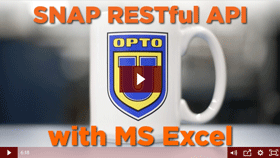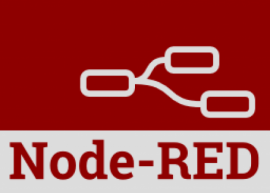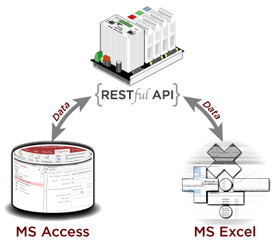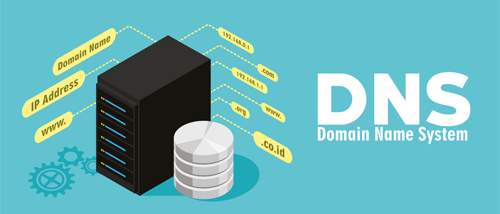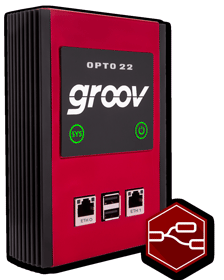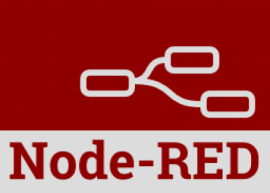If you're looking to connect real-world signals and industrial "things" to Information Technology (IT) systems, cloud software, and mobile devices, you already know Opto 22 products will serve you well.
Topics: groov, Internet of Things, IoT, optonews, PACs, Networking, I/O, IIoT, Industrial Internet of Things, OptoNews 2016-11-30
OptoNews: New PAC REST API video - exchange data with Excel
What does the new built-in RESTful API in Opto 22 SNAP PAC S-series and R-series programmable automation controllers mean to you?
It means you can use a variety of programming languages to easily access data in the PAC.
Topics: Videos, Internet of Things, IoT, optonews, PACs, PAC Control, API, REST API, RESTful server, REST, IIoT, Industrial Internet of Things, OptoNews 2016-11-30
OptoNews Tip: Set up custom troubleshooting in PAC Manager
When you're troubleshooting system problems, PAC Manager can be a big help. That's because PAC Manager communicates directly with your controllers and I/O units.
You're probably already familiar with PAC Manager's Inspect window, where you can see detailed status data on an I/O unit or controller. This tip shows you a way to create your own custom checks on anything in the Inspect window.
Topics: Tips, optonews, PACs, PAC Manager, OptoNews 2016-11-30
OptoNews: Are you an Operations Technology engineer?
Gone are the days when the control system engineer—"you know, the instrumentation guy, the DCS guy, the PLC and HMI guy"—can handle what needs to be done in automation, says Steve Malyszko, P.E.
Malyszko's recent article in Automation World says the old skills just won't be enough anymore.
Topics: Process control, Discrete control, Internet of Things, IoT, optonews, Integrators, Careers, IIoT, Industrial Internet of Things, OptoNews 2016-11-09
Are you wiring together devices and software using Node-RED? If you're even thinking about it, we've got a new Node-RED OptoForum for you.
We announced in the last OptoNews that Node-RED is now a built-in feature in the GROOV-AR1 groov Box!
Topics: groov, Internet of Things, IoT, optonews, IIoT, Industrial Internet of Things, Node-RED, OptoNews 2016-11-09
OptoNews: node.js Interactive conference invitation
Here's a chance to learn more about the latest Internet of Things (IoT) technologies, November 29 through December 2 in Austin, Texas—and at a 20% discount.
If you're a JavaScript developer (or might want to be), join us at Node.js Interactive North America.
Topics: Internet of Things, IoT, optonews, Events & conferences, IIoT, Industrial Internet of Things, OptoNews 2016-11-09
OptoNews Tip: Share SNAP PAC data with Excel or Access
Have you wanted to share I/O point or variable data from your SNAP PAC controller with a Microsoft® Excel® spreadsheet or Access® database?
- Maybe you're tracking sales in a spreadsheet and want to adjust production to match projections.
- Maybe your PAC is monitoring equipment on-time and energy usage, and you want to add that data to an equipment maintenance database.
Topics: Internet of Things, Tips, IoT, optonews, PACs, API, REST API, REST, IIoT, Industrial Internet of Things, OptoNews 2016-11-09
And It’s Going to Happen Again.
Last week the Internet experienced the largest cyber attack in history. Many popular websites went offline for the better part of a day as three waves of cyber attacks hit the DNS infrastructure company DynDNS.
But how could an attack on a single infrastructure company wreak such havoc across the entire Internet?
Topics: groov, Internet of Things, IoT, Networking, Security, IIoT, Industrial Internet of Things
OptoNews: IIoT tool Node-RED included in new groov Admin release
Just released! A major new tool for your Industrial Internet of Things (IIoT) project: the groov Box with Node-RED built in.
What is Node-RED?
It's an open-source, cross-platform tool for wiring together hardware devices, databases, cloud services, and APIs (application program interfaces) with simple logic flows.
Topics: groov, Internet of Things, Updates, IoT, optonews, PACs, mobile, IIoT, Industrial Internet of Things, OptoNews 2016-10-26, Node-RED
OptoNews: New blog post explains Node-RED for IIoT projects
Node-RED is now included in the GROOV-AR1 groov Box!
But what exactly is Node-RED, and why is that useful to you?
Topics: Internet of Things, IoT, optonews, IIoT, Industrial Internet of Things, OptoNews 2016-10-26, Node-RED


